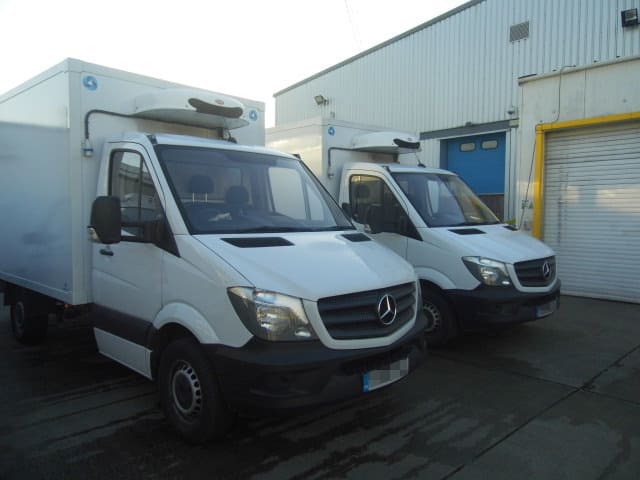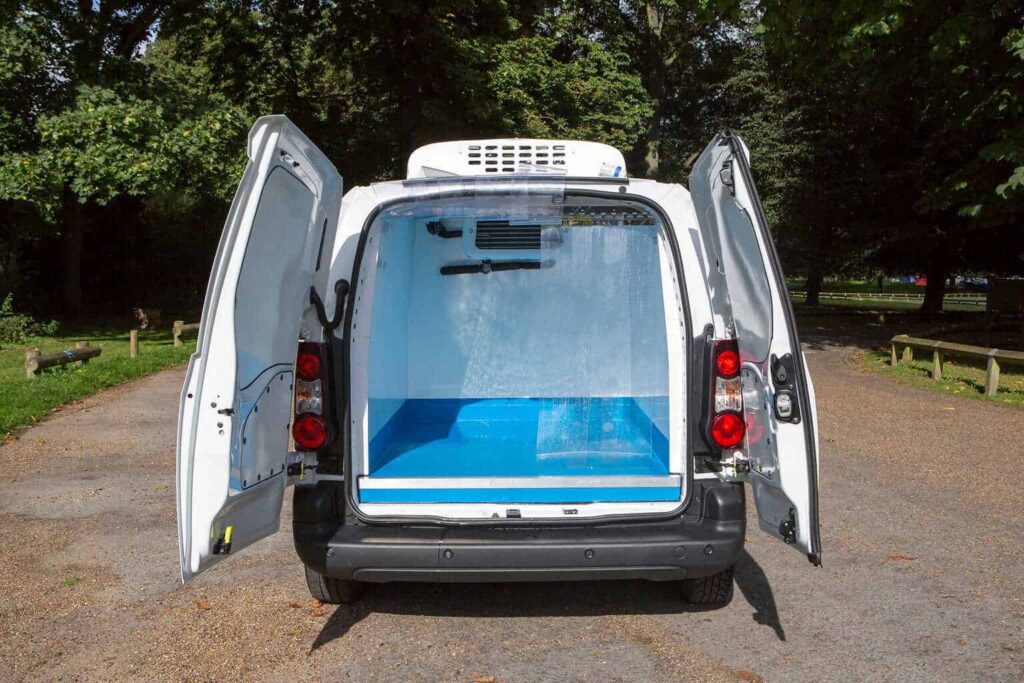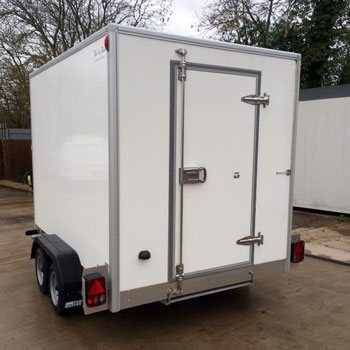Efficient and safe transportation of perishable goods from point A to point B isn’t just an advantage; it’s a necessity for many businesses. From food and beverage suppliers to pharmaceutical companies, the demand for reliable cold chain logistics has never been higher.
Refrigerated vans play a pivotal role, serving as the backbone of temperature-sensitive transport throughout the UK. These specialised vehicles are equipped with state-of-the-art refrigeration systems designed to maintain specific climate conditions, ensuring that perishable goods remain fresh, safe, and consumable upon reaching their destination.
However, acquiring a refrigerated van comes with its set of decisions, primarily whether to buy or rent. This debate isn’t merely about comparing costs but understanding the depth of one’s business needs, projected growth, and the flexibility required to adapt to market demands. While purchasing a van outright might seem like a straightforward investment in your company’s logistics infrastructure, it might not always be the most cost-effective or adaptable option in the long run.
Check out our post: A Fridge Van Guide for Butchers.
The Benefits Of Buying Refrigerated Vans
The decision to purchase a refrigerated van is significant, encompassing considerations beyond mere immediate operational needs. For many businesses, buying a refrigerated van represents a strategic investment with long-term benefits. Below, we explore the advantages of making such a purchase.
Capital Investment
Buying a refrigerated van is a capital investment, signifying a commitment to the growth and efficiency of a business’s operations. In the long term, this investment can lead to substantial cost savings by eliminating rental fees or charges associated with leasing. Ownership of the van ensures there are no limitations on usage, such as mileage caps or rental periods, providing businesses with complete control over their logistics and delivery schedules.
Additionally, although the initial outlay may be substantial, the investment in a refrigerated van can enhance the operational capacity of a business, enabling it to meet increased demand and expand its service offerings.
Customisation
One of the standout advantages of owning a refrigerated van is the ability to customise the vehicle to meet specific business needs. Whether it’s modifying the shelving and storage systems for optimal loading and unloading efficiency, installing advanced temperature control systems for different types of perishable goods, or branding the exterior with the company’s logo and colours for marketing purposes, owning the van allows for such tailor-made modifications.
This level of customisation can provide businesses with a competitive edge, ensuring that the van is perfectly suited to their operational requirements and branding strategies.
Equity Building
Purchasing a refrigerated van contributes to asset accumulation and equity building for a business. Over time, as the loan on the van is paid down, the business increases its equity, strengthening its financial position. While vehicles typically depreciate over time, a well-maintained refrigerated van still holds value and can be sold or traded in for a newer model in the future.
Tax Benefits
There are potential tax deductions and benefits associated with purchasing a refrigerated van that businesses can take advantage of. Depending on the jurisdiction, businesses may be able to write off the depreciation of the van, deduct interest on any loans used to purchase the vehicle and claim deductions for operational expenses such as fuel, maintenance, and repairs.
The Benefits of Renting Refrigerated Vans
Renting refrigerated vans presents a compelling alternative to purchasing, offering several advantages that align with the operational and financial strategies of many businesses. From cost savings to flexibility, the benefits of renting can be particularly appealing, especially for businesses with variable demands or those looking to minimise capital expenditure.
Lower Initial Cost and Predictable Payments
One of the most immediate benefits of renting a refrigerated van is the lower initial cost. Unlike purchasing, which often requires a significant upfront investment or down payment, renting allows businesses to access the vehicles they need without a large financial commitment upfront.
This can be particularly advantageous for new or small businesses that may not have the capital for such investments or for larger companies seeking to preserve their cash flow for other strategic initiatives. Renting your vehicles means regular monthly payments for your hire agreement so you know the exact outgoings for your fleet.
Flexibility
Flexibility is another key advantage of renting refrigerated vans. Rental agreements can range from short-term to long-term, providing businesses with the ability to adjust their fleet size according to their current needs. This means that a business can easily scale up its number of vans during peak seasons or scale down when demand is lower, without the financial repercussions associated with owning an underutilised asset.
Additionally, renting offers the opportunity to trial different van models and configurations, ensuring that the business can always use the vehicle best suited to its changing needs. When newer models with better technology or improved fuel efficiency become available, businesses can upgrade without the hassle or cost of selling an owned vehicle.
Maintenance and Servicing included
Another significant benefit of renting refrigerated vans is that maintenance and services are often included in the rental agreement. This arrangement can relieve businesses of the time-consuming and costly responsibility of vehicle upkeep.
Regular maintenance checks, necessary servicing, and even roadside assistance are typically managed and covered by the rental company, ensuring that the vans remain in optimal condition and reducing the risk of unexpected downtime.
Seasonal Demand
For businesses that experience seasonal fluctuations in demand, renting refrigerated vans offers an ideal solution. The flexibility to adjust the size of the vehicle fleet in response to seasonal peaks and troughs ensures that businesses are not left with idle assets during quieter periods.
This adaptability can lead to significant cost savings and operational efficiency, as businesses pay only for what they need when they need it.
Exploring Long-Term Lease and Hire Contracts
Long-term lease contracts for refrigerated vans offer a middle ground between the commitment of buying and the flexibility of short-term rentals. These agreements typically span several years, providing businesses with the extended use of a refrigerated van without the ownership responsibilities.
Understanding how long-term leases work and their distinct benefits can help businesses make informed decisions that align with their operational needs and financial strategies.
How They Work
A long-term lease contract for a refrigerated van is an agreement where the lessee pays a monthly fee to use the vehicle for an extended period, usually ranging from one to five years. Unlike short-term rentals that may last from a day to a few months, long-term leases are designed for businesses that need a reliable solution for their logistical challenges over a more extended period.
This arrangement differs from outright purchasing by eliminating a large upfront cost and the long-term depreciation concerns associated with ownership. At the end of the lease term, the business typically has the option to purchase the van at a predetermined price, renew the lease, or return the vehicle to the lessor.
Predictable Monthly Payments:
One of the primary advantages of long-term leasing is the predictability of expenses. Businesses can budget more effectively with fixed monthly payments that cover the use of the van. This predictability aids in financial planning and management, providing stability in operational costs.
Maintenance Inclusion:
Many long-term lease agreements include maintenance and repair services, similar to short-term rentals. This provision can significantly reduce the lessee’s burden of keeping the vehicle in good condition, ensuring that the refrigerated van remains operational and efficient without additional costs.
Options at Lease End:
At the end of a lease term, businesses have several options, offering flexibility not typically available with outright purchases. If the van has proven invaluable and suited to the company’s needs, there may be an option to buy it at a reduced price. Alternatively, the business can return the van and possibly upgrade to a newer model under a new lease agreement, maintaining access to the latest technology and features without a significant financial outlay.
Making the Right Choice for Your Business
Deciding whether to rent or buy a refrigerated van is a significant decision that can impact your business’s operational efficiency and financial health. This choice should be aligned with your company’s current needs, future aspirations, and financial capabilities. Below, we explore key considerations and strategies to aid in this decision-making process, ensuring that businesses can make an informed choice that best supports their goals.
Factors to Consider when buying your vehicles
Budget Constraints:
Initial capital outlay and monthly cash flow implications should be considered. Buying a refrigerated van requires a substantial upfront investment (and may require finance), whereas renting or leasing offers predictable monthly spend with a lower impact on cashflow, impacting your budget differently.
Long-term Business Goals:
Consider how the van fits into your long-term business strategy. Buying may be more suitable for businesses with a stable demand for logistics, while renting or leasing offers flexibility to adapt to changing business landscapes.
Level of Flexibility Required:
Assess the level of flexibility your business needs in terms of fleet size and vehicle specifications. Renting allows for easy upgrades or downscaling, which is crucial for businesses with fluctuating demand or those in growth phases.
Cost-Benefit Analysis
Conducting a detailed cost-benefit analysis is crucial to compare the total costs of ownership versus renting or leasing over time. This analysis should include:
Initial Purchase or Down Payment and Monthly Payments:
Compare the upfront costs and ongoing monthly expenses associated with each option.
Maintenance and Servicing Costs:
Factor in the expected maintenance and servicing expenses for owning a vehicle versus the often-included maintenance in rental agreements.
Depreciation:
Consider the depreciation of a purchased van over time and how this affects its value as a business asset.
Tax Implications:
Evaluate the tax benefits of each option, including potential deductions for operating expenses, interest on loans, and depreciation for owned vans.
Questions to Ask Providers
When exploring renting or buying options, it’s essential to gather all pertinent information to make an educated decision. Here are some critical questions to ask providers:
- What are the terms and conditions of the rental or lease agreement? Understanding the length of the agreement, monthly payments, and what’s included (e.g., maintenance, insurance) is crucial.
- Can the rental or lease agreement be customised to fit specific needs? Ask about the possibility of adjusting the terms to better suit your business requirements, such as varying the term or including additional services.
- What happens at the end of a term? If considering leasing, inquire about the options available at the end of the lease, such as purchasing the van, extending the lease, or returning the vehicle.
- What are the conditions and costs associated with early termination? It’s important to understand the financial implications and conditions if you need to terminate a rental or lease agreement prematurely.
- How is maintenance handled? Clarify whether maintenance and servicing are included in the rental or lease agreement and understand the process for addressing vehicle issues.
- What are the insurance requirements? Understand whether insurance is provided within the rental or lease agreement or if it’s an additional cost that needs to be covered by your business.
Making the right choice between renting and buying a refrigerated van involves a comprehensive analysis of your business’s operational requirements, financial capacity, and long-term goals. By carefully considering these factors and seeking detailed information from providers, businesses can ensure they opt for the solution that best aligns with their needs, offering optimal flexibility, cost-efficiency, and support for their growth and success.
Choose FridgeXpress
Ready to take your business logistics to the next level with a reliable, efficient refrigerated van solution?
FridgeXpress is here to drive your success. With a UK-wide network, we offer an extensive fleet of refrigerated vans suited for short and long-term hires, catering to the unique needs of diverse businesses. Whether you’re scaling up, managing seasonal demands, or looking for the most cost-effective way to transport your perishable goods, FridgeXpress has the flexibility and expertise to support your journey.
Don’t let logistics challenges slow down your business growth. Choose FridgeXpress for:
- Competitive pricing tailored to your business needs.
- A wide range of modern, fully maintained refrigerated vans that can be customised to your needs
- Customisable hire terms are designed to offer you the flexibility your business requires.
- Exceptional customer service from a team that understands the importance of your deliveries.
Visit our website to find out more and get started with FridgeXpress – your partner in reliable and efficient refrigerated transport solutions.




